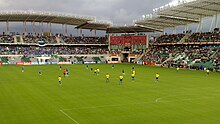Lilleküla Stadium
 | |
 | |
| Former names | FC Flora Lilleküla Stadium |
|---|---|
| Location | Asula 4c, Kesklinn, Tallinn, Estonia |
| Coordinates | 59°25′16.65″N 24°43′55.38″E / 59.4212917°N 24.7320500°E |
| Owner | Estonian Football Association |
| Operator | Estonian Football Association |
| Capacity | 14,405[1] |
| Field size | 105 by 68 metres (344 by 223 ft)[2] |
| Construction | |
| Broke ground | 2000 |
| Opened | 2 June 2001 |
| Expanded | 2016–2018 |
| Construction cost | 131 million EEK (2002) |
| Architect | Haldo Oravas |
| Tenants | |
| Flora (2001–present) Estonia national football team (2001–present) | |
The A. Le Coq Arena (known as Lilleküla Stadium prior to sponsorship and during UEFA competitions) is a football stadium in Tallinn, Estonia. It is the home ground of football club Flora and the Estonia national football team. With a capacity of 14,405, it is the largest football stadium in Estonia.
History
In July 1998, Flora submitted a planning application to Tallinn City Council, requesting permission to build a new stadium on wasteland between railway lines in Kitseküla, close to the border with neighbouring Lilleküla.[3] Receiving the council's approval, Flora signed a 99-year lease on the estate and construction began in October 2000.[4] The stadium was designed by Haldo Oravas.
The stadium was officially opened 2 June 2001, with a 2002 FIFA World Cup qualification match between Estonia and the Netherlands. The match saw Estonia's Andres Oper become the first player to score at the new stadium when he scored in the 65th minute, with the full-time result being a 2–4 loss.

In January 2002, A. Le Coq bought naming rights for the stadium and Lilleküla Stadium was renamed A. Le Coq Arena.

Aside from football and other sporting events, several concerts have been held at A. Le Coq Arena, such as Lenny Kravitz in 2005 and Aerosmith in 2007.[1]
During the 2012 UEFA European Under-19 Championship, the stadium hosted 6 out of 15 tournament matches, including the final.
In 2012, Flora completed the transfer ownership of the Lilleküla Football Complex, including A. Le Coq Arena, to the Estonian Football Association.
In September 2016, it was announced that the stadium would host the 2018 UEFA Super Cup. In preparation for the match, the stadium's capacity was increased from 10,000 to 15,000.[5] The 2018 UEFA Super Cup match between the 2017–18 UEFA Champions League winners Real Madrid and the 2017–18 UEFA Europa League winners Atlético Madrid was held on 15 August 2018, with Atlético Madrid winning 4–2 in extra time.[6]
Lilleküla Football Complex
A. Le Coq Arena is the centrepiece of the Lilleküla Football Complex, which also includes two grass surface pitches, two artificial turf pitches and an indoor hall.[1]
References
- ^ a b c "A. Le Coq Arena" (in Estonian). Estonian Football Association. Retrieved 15 August 2018.
- ^ "A. Le Coq Arena staadion". Eesti spordiregister (in Estonian). Retrieved 15 August 2018.
- ^ "Prügimäest saab staadion" [Waste ground will become a stadium]. Postimees (in Estonian). 25 July 1998.
- ^ "FC Flora rajab Lillekülasse jalgpallistaadioni" [FC Flora will build a football stadium in Lilleküla]. Eesti Päevaleht (in Estonian). 19 October 2000.
- ^ "Tallinn to stage 2018 UEFA Super Cup". UEFA.com. 8 August 2017.
- ^ "Atlético win UEFA Super Cup in extra time". UEFA.com. 16 August 2018.
External links
- A. Le Coq Arena at Estonian Football Association Template:Et icon
- A. Le Coq Arena at FC Flora Template:Et icon
